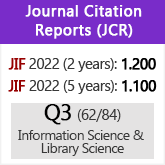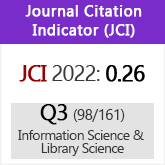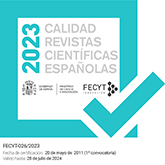Open access to research data: a track towards scientific collaboration
DOI:
https://doi.org/10.3989/redc.2014.4.1154Keywords:
Open access, research data, data repositories, data citation, open access policiesAbstract
Knowledge transfer should be facilitated by the opportunities offered by information technologies, as they affect the access and distribution of digital objects. However barriers to the access and reuse of scholarly research, whether economic or copyright-related, inhibit the sharing of this valuable common good. The open access movement promotes the elimination of these barriers and advocates for an open access culture of sharing and reusing materials, while guaranteeing that authors be duly acknowledged and that the data be used responsibly. If scientific papers have historically been essential for the communication of science, in the digital age it is now their building blocks that have gained greater importance, especially the observational, descriptive or experimental data that underpin the articles. Open research data can be reused, transformed by new methods or aggregated to other sources. Open access to research data avoids redundancy, provides transparency on how they have been obtained and allow for their validation. This work provides an overview of some initiatives and recommendations on how to share and manage research data and foster open access to it, as a means of collaboration between groups or individuals working in similar disciplines.
Downloads
References
Bartling, S.; Friesike, S. (2014). Towards Another Scientific Revolution. En Bartling, S.; Friesike, S. (Eds.). Opening Science. Cham; Springer International Publishing.
Borgman, C. (2012a). Why are the attribution and citation of scientific data important? In Uhlir, P. F. (Ed.). For attribution: Developing scientific data attribution and citation practices and standards: Summary of an international workshop. Washington, D.C.; National Academies Press. pp. 1-10. http://www.nap.edu/catalog.php?record_id=13564 [Consultado 28/01/2014].
Borgman, C.L. (2012b). The conundrum of sharing research data. Journal of the American Society for Information Science and Technology, vol. 63(6), pp. 1059-1078. http://dx.doi.org/10.1002/asi.22634
Budapest Open Access Initiative (2012). Diez años desde la Budapest Open Access Initiative: hacia lo abierto por defecto. http://www.budapestopenaccessinitiative.org/boai-10-translations/spanish [Consultado 28/01/2014].
COAR (2013). Horizon 2020 – Outline of a Pilot for Open Research Data. http://www.coar-repositories.org/files/Horizon_2020_Open_Data_Pilot_20130703_final.pdf [Consultado 28/01/2014].
Coates, H.; Konkiel, S.; Witt, M. (2013). Data Services: Making It Happen. https://scholarworks.iupui.edu/handle/1805/3278 [Consultado 30/01/2014].
Costas, R.; Meijer, I.; Zahedi, Z.; Wouters, P. (2013). The Value of Research Data - Metrics for datasets from a cultural and technical point of view. A Knowledge Exchange Report, http://www.knowledge-exchange.info/datametrics [Consultado 28/01/2014].
DataCite (2014). DataCite, re3data.org, and Databib Announce Collaboration http://www.datacite.org/node/115 [Consultado 10/04/2014].
Denton Declaration: An Open Access Data Manifesto (2012). Annual University of North Texas Symposium on Open Access. http://openaccess.unt.edu/denton-declaration [Consultado 28/01/2014].
Digital.CSIC. Buenas prácticas y directrices para datos de investigación en Digital.CSIC. http://digital.csic.es/politicas/politicaDatos.jsp [Consultado 30/01/2014].
e-InfraNet (2013). 'Open' as the Default Modus Operandi for Research and Higher Education. http://e-infranet.eu/output/e-infranet-open-as-the-default-modus-operandi-for-research-and-higher-education/ [Consultado 28/01/2014].
European Comission (2009). Open Access in FP7. http://ec.europa.eu/research/science-society/index.cfm?fuseaction=public.topic&id=1300 [Consultado 30/01/2014].
European Comission (2013). Commission launches pilot to open up publicly funded research data. http://europa.eu/rapid/press-release_IP-13-1257_en.htm [Consultado 30/01/2014].
FECYT- Grupo de Trabajo de "Depósito y Gestión de datos en Acceso Abierto" del proyecto RECOLECTA (2012). La conservación y reutilización de los datos científicos en España. Informe del grupo de trabajo de buenas prácticas. Madrid: Fundación Española para la Ciencia y la Tecnología, FECYT. http://digital.csic.es/handle/10261/65317 [Consultado 10/10/2014]
Harnad S.; Brody T. (2004). Comparing the impact of open access vs. non open access articles in the same journals. D-Lib Magazine, vol. 10 (6).
Hitchcock, S. (2013). The effect of open access and downloads ('hits') on citation impact: a bibliography of studies. http://eprints.soton.ac.uk/354006/1/oacitation-biblio-snapshot0613.html [Consultado 28/01/2014].
MELIBEA. Directorio y estimador de políticas en favor del acceso abierto a la producción científica. http://www.accesoabierto.net/politicas/ [Consultado 30/01/2014].
Merlo Vega, J. A.; Angosto Castro, A.; Ferreras Fernández, T.; Gallo León, J. P.; Maestro, J. Á.; Ribes Llopes, I. (2011). Ciencia 2.0: aplicación de la web social a la investigación. Madrid; REBIUN.
MIT Libraries (2014). Manage Your Data. Data Management: Subject Guides. http://libraries.mit.edu/guides/subjects/data-management/ [Consultado 28/01/2014].
National Science Foundation (2013). NSF Data Management Plan Requirements. http://www.nsf.gov/bfa/dias/policy/dmp.jsp [Consultado 28/01/2014].
National Institutes of Health (NIH) (2008). NIH Public Access Policy Details. http://publicaccess.nih.gov/policy.htm [Consultado 30/01/2014].
Odisea. International registry on Research data. http://odisea.ciepi.org/es [Consultado 30/01/2014].
Open Knowledge Foundation (2014a). Definición de conocimiento abierto. http://opendefinition.org/od/espanol/ [Consultado 11/04/2014].
Open Knowledge Foundation (2014b). Guide to Open Data Licensing. http://opendefinition.org/guide/data/ [Consultado 11/04/2014].
OpenAIRE (Open Access Infrastructure for Research in Europe). http://www.openaire.eu/ [Consultado 28/01/2014].
Pampel, H.; Vierkant, P.; Scholze, F.; Bertelmann, R.; Kindling, M.; Klump, J.; Goebelbecker, H.; Gundlach, J.; Schirmbacher, P.; Dierolf, U. (2013). Making Research Data Repositories Visible: The v re3data.org Registry. PLoS ONE, 8(11): e78080. http://dx.doi.org/10.1371/journal.pone.0078080
Piwowar, H.; Vision, T.J. (2013). Data reuse and the open data citation advantage. PeerJ PrePrints 1:e1v1. http://dx.doi.org/10.7287/peerj.preprints.1v1
Ribeiro, C.; Hernández-San-Miguel, J. (2013). DATABIB: an online catalog of research data repositories. I Congresso ISKO Espanha e Portugal / XI Congresso ISKO Espanha. Porto, Portugal. Scientific Data. http://www.nature.com/scientificdata/ [Consultado 28/01/2014].
SHERPA/JULIET. Juliet Statistics. http://www.sherpa.ac.uk/juliet/stats.php?la=en&mode=simple [Consultado 29/01/2014].
SPARC. HowOpenIsIt? New Guide Released. http://sparc.arl.org/resource/howopenisit [Consultado 28/01/2014].
Swan, A. (2010). The open access citation advantage: studies and results to date. http://eprints.ecs.soton.ac.uk/18516 [Consultado 26/01/2014].
The Royal Society (2012). Science as an Open Enterprise. The Royal Society Science Policy Centre report 02/12. http://royalsociety.org/policy/projects/science-public-enterprise/report [Consultado 28/01/2014].
Wagner, B. (2010). Open access citation advantage: An annotated bibliography. Issues in Science and Technology Librarianship, vol. 60 (2).
Wellcome Trust (2011). Sharing research data to improve public health: full joint statement by funders of health research. http://www.wellcome.ac.uk/About-us/Policy/Spotlight-issues/Data-sharing/Public-health-and-epidemiology/WTDV030690.htm [Consultado 29/01/2014].
White House Directive (2013). Increasing Access to the Results of Federally Funded Scientific Research. http://www.whitehouse.gov/sites/default/files/microsites/ostp/ostp_public_access_memo_2013.pdf [Consultado 30/01/2014].
Wicherts, J.M.; Bakker, M.; Molenaar, D. (2011). Willingness to Share Research Data Is Related to the Strength of the Evidence and the Quality of Reporting of Statistical Results. PLoS ONE 6(11): e26828. http://dx.doi.org/10.1371/journal.pone.0026828
Published
How to Cite
Issue
Section
License
Copyright (c) 2014 Consejo Superior de Investigaciones Científicas (CSIC)

This work is licensed under a Creative Commons Attribution 4.0 International License.
© CSIC. Manuscripts published in both the printed and online versions of this Journal are the property of Consejo Superior de Investigaciones Científicas, and quoting this source is a requirement for any partial or full reproduction.All contents of this electronic edition, except where otherwise noted, are distributed under a “Creative Commons Attribution 4.0 International” (CC BY 4.0) License. You may read here the basic information and the legal text of the license. The indication of the CC BY 4.0 License must be expressly stated in this way when necessary.
Self-archiving in repositories, personal webpages or similar, of any version other than the published by the Editor, is not allowed.

















